Artist + Researcher Project = Success
A new initiative of the Art in Medicine program at the College of Medicine – Phoenix pairs scientists with artists to create visual depictions of research.
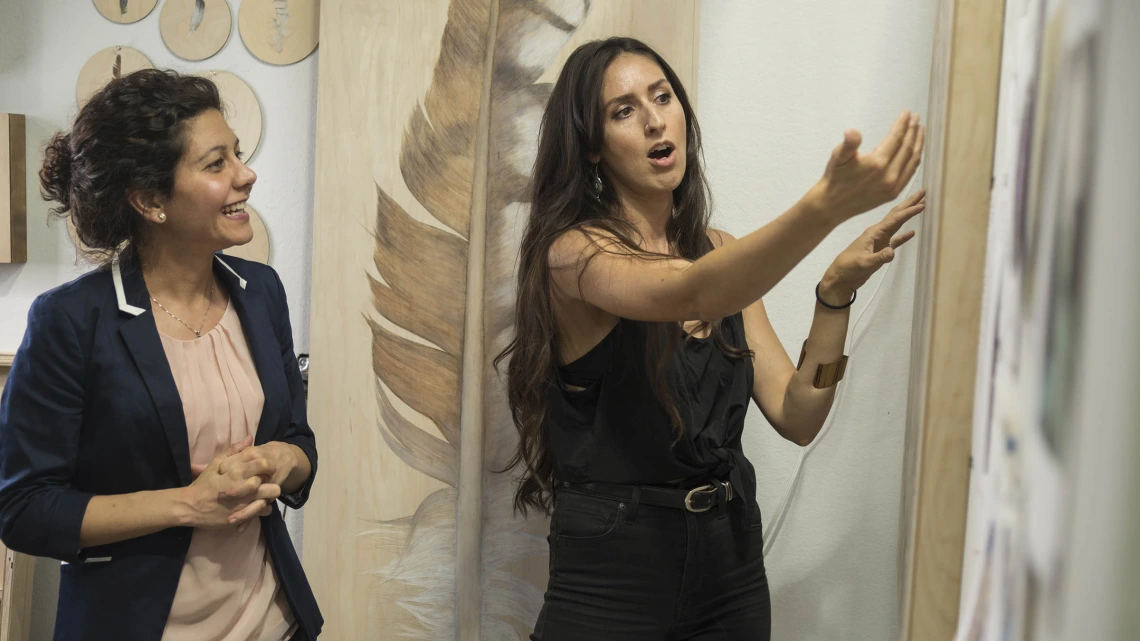
Alexandra “Lexie” Bowers, a wood burning and mixed media artist, shows Shirin Doroudgar, PhD, an assistant professor at the College of Medicine – Phoenix, the progress she has made on the art inspired by Dr. Doroudgar’s heart cell research.
Scientists at UArizona College of Medicine – Phoenix are well versed in tackling complex medical questions, but what happens when the challenge is to pair up researchers with artists and translate that scientific knowledge into an artistic representation accessible to everyone?
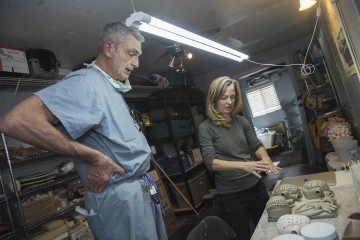
Ceramic artist Danielle Wood shows her progress in making ceramic representations of various mechanical heart implant devices to Michael Murray, MD, PhD, MCCM, a professor of anesthesiology and internal medicine at the College of Medicine – Phoenix.
The answer: a “speed dating-like” event.
The unconventional approach was how Dr. Standley, a professor in the Department of Bioethics and Medical Humanism, was able to pair researchers and Phoenix-based artists for the new Artist + Researcher exhibit at the Phoenix Bioscience Core (PBC).
“The speed dating was pretty interesting,” Dr. Standley said. “We tried to think of a way where all the artists and researchers could meet each other that would be time efficient. So, we thought of the speed dating idea.”
After the event, the artists and researchers submitted their top three choices of who they would like to be paired with for the project.
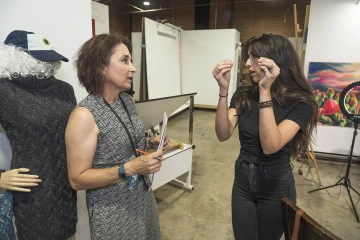
(From left) Cynthia Standley, PhD, a professor in the Department of Bioethics and Medical Humanism and director of the Art in Medicine program at the College of Medicine – Phoenix, checks in with Bowers on the progress of her art for the Artist + Researcher exhibit.
“When Dr. Standley brought up the idea of the Artist + Researcher project, light bulbs just started going off on how to make this happen,” Anderson said. “I hit go immediately. Between the two of us, we had connections to bring together the heavy hitters in both science and art within the downtown Phoenix community.”
Artist + Researcher is part of Art in Medicine, a program Dr. Standley started in 2014 that has primarily exhibited curated artwork by local artists at PBC. The concept of pairing artists with researchers is based on a similar program at the University of Southern California’s Keck School of Medicine.
The idea is to see what happens when research is presented through an artistic lens. The paired artists and researchers learn about each other’s work through dialogue and studio or lab visits. They work together to create a visual language that will make the science more accessible and understandable to the general public.
Mutual respect and awe
“If there are 206 bones in the human body, not one of mine has an iota of artistic talent,” said Michael Murray, MD, PhD, MCCM, a professor of anesthesiology and internal medicine at the College of Medicine – Phoenix. “However, I can still appreciate art. This project appealed to me because what better way to describe the devices we use than through art?”
“I knew I would enjoy this project … but I had no idea the journey would be so rewarding and exciting.”
Shirin Doroudgar, PhD
Dr. Murray, who is the director of ICU integration and medical director of cardiovascular ICU at Banner – University Medical Center Phoenix, is paired with ceramic artist Danielle Wood.
“It has been really amazing to see Dr. Murray’s research up close and be able to work directly with the devices while recreating the forms,” Wood said. “I feel art is a great way to discuss research in an inviting manner, where the audience can explore these medical innovations through sculptural forms and learn about the processes that they serve.”
Another artist working on the project is Alexandra “Lexie” Bowers, who was paired with Shirin Doroudgar, PhD, an assistant professor at the College of Medicine – Phoenix. Bowers specializes in pyrography, or wood burning, and mixed media art.
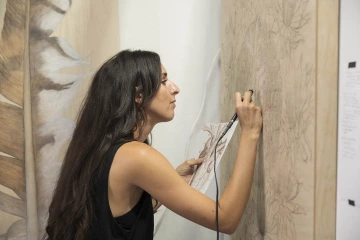
Bowers works on her art that is based on Dr. Doroudgar’s heart cell research.
“One of the aspects of Shirin’s research that resonates the most with me is the idea of looking at heart cells that begin in the heart and then leave to communicate with the rest of the body,” Bowers said. “It is incredibly complex. It's been like learning a foreign language, but she’s done a tremendous job of breaking down her research for me to comprehend what she’s focusing on.”
The admiration between artist and researcher goes both ways.
“I have learned that art is a process with many dimensions and stages,” Dr. Doroudgar said. “Vision, intuition, collaboration, discipline and technique are all equally important, and I find this is common ground for artists and researchers. Going on this journey with Lexie has given me an appreciation for the similarities between artists and researchers.”
A rewarding experience
Dr. Standley wanted to include researchers from Arizona State University and Northern Arizona University, as well, as both are located on the PBC. In the end, there are six researchers from UArizona, two from ASU and two from NAU.
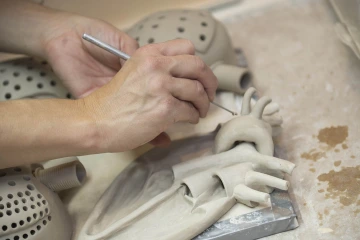
“It has been really amazing to see Dr. Murray’s research up close and be able to work directly with the devices while recreating the forms,” Wood said.
“The Artist + Researcher program was created to deepen the Phoenix Bioscience Core’s relationship with the community,” said David Krietor, executive director of the PBC. “This program allows researchers from each of the three universities to share the work they’redoing with a wider audience by tapping into the creative genius of these local artists. We’re so proud of the work that these teams created, and we’re excited to see this program continue to flourish in years to come.”
“This is something new for everyone,” Dr. Standley added. “The researchers will see their work displayed in a unique way and the artist may learn something they didn’t previously know and potentially create something in a way they haven’t tried before.”
The researchers and artists taking part in the project say Dr. Standley’s vision for the project has succeeded.
“I knew I would enjoy this project, and I hoped that we would create art that conveys meaning and is open to interpretation, but I had no idea the journey would be so rewarding and exciting,” Dr. Doroudgar said. “I personally wish everyone could see and appreciate the beauty of the elegant machinery that makes up our cells and our tissues. Biomedical research can inspire art, which can in turn inspire us to learn more about ourselves.”
Artist + Researcher Participants
Artist
Alexandra Bowers
Michale Marlow
Mark Pomilio
Rembrandt Quiballo
Danielle Wood
Denise Yaghmorian
Researcher
Shirin Doroudgar, PhD
Jonathan Lifshitz, PhD
Taben Hale, PhD
Theresa Currier Thomas, PhD
Michael Murray, MD, PhD, MCCM
Tobias Jakobi, PhD
Artist
Susan Beiner
Lily Reeves
Researcher
David Coon, PhD, MEd
Shelby Langer, PhD
Artist
Bill Dambrova
Researcher
Cynthia Ivy, OTD, MEd, and
Gretchen Bachman, OTD, MBA
Artist + Researcher is scheduled for a private VIP opening Aug. 12. The public opening will take place Sept. 2 from 6-10 p.m. at the Health Sciences Education Building as part of the First Friday Art Walk. Additional dates and locations have not been confirmed, but there are plans to take the exhibit on public display throughout the state, including the UArizona Health Sciences campus in Tucson.

